Resumen en español al final del artículo
(Editor's Note: Thanks to a Google News Alert I discovered this remarkable blog post by Evan Szablowski. He was researching another project in Ethiopia when he was presented with the chance to visit the village where Nicholas Negroponte's previously announced helicopter deployment pre-pilot is taking place. The following text is an excerpt from Evan Szablowski's original post and is re-published here with his permission.)
As we got out of the car I was expecting to see a lively village, perhaps centered around one area with various people working. However, the "village" was really just a sparse connection of huts that spread out forever alongside the mountains. Every hilltop or small plain just had a simple circular building of wood and mud with maybe a sheet metal roof. We arrived at such a site, and it didn't seem particularly significant except for one rectangular building that stood out for being slightly too developed. Its walls and angles were more straight than usual and it was fitted with windows that could open and close, rare for most huts in the highlands. As we walked closer down the mountain we could see solar panels aligned on top of the roof - technology that seemed completely out of place in its surroundings. This unique building was built by MIT as the village's new school house and storehouse for the precious tablet computers.
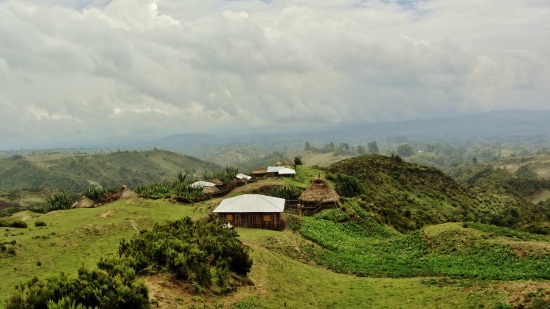
The beautiful village in the highlands (The school house is the foremost building)
As we moved down towards the school house people began materializing out of nowhere, especially the children. I guess it is a unique day to have a couple of "Ferengis" (Foreigners) to come visit in the highlands. This village is not open to tourism, and I bet we were some of the few white faces that many of these kids had ever seen. So naturally we were an attraction as many of the children were just as fascinated by us as we were by them.
Michael, who works as a regional representative in MIT's One Laptop per Child project in Ethiopia, showed us into the school house, which was quite plain except for the wires running down from the solar panels to an enclosed server. On a table lie the pieces of technology that we came to see: around 20 tablets, blending right in to the surroundings in their rough leather covers. As we entered the children came pouring in behind us, eager to be a part of whatever was going on. Michael picked out a 6-7 year-old kid that he labeled as one of the quickest learners and gave him a tablet. He readily accepted it, and watching what happened next was one of the most impactful parts of the entire trip.
Forget the fact that this kid never grew up with technology. Forget the fact that he may have never seen an iPhone, or opened Firefox, or had his own Facebook account. When the tablet was in his hands, it was natural. As he began to play with it I was blown away by his ease and intuition with the device; it was like he grew up with it. It was amazing to see the working juxtaposition of high technology in his small village hands. He knew exactly what he was doing. But even more fascinating than his knowledge of the technology were the demonstrations of what it had taught him.
He scrolled through a few apps and picked one of his favorites - an alphabet game that spoke the name and sound of a letter when the picture was touched. He began to show off, naming each letter and sound before pressing the corresponding picture. He started at "A" and rushed through the entire alphabet perfectly. He then proceeded to sing the ABCs, and unexpectedly the other kids around him joined right in. I was in a tiny village in the mountains of Ethiopia (where the native tongue is the Semitic language Amharic), hearing a chorus of small voices sing the alphabet song. In the three months with the tablets, they had already mastered the letters and basic sounds of English.
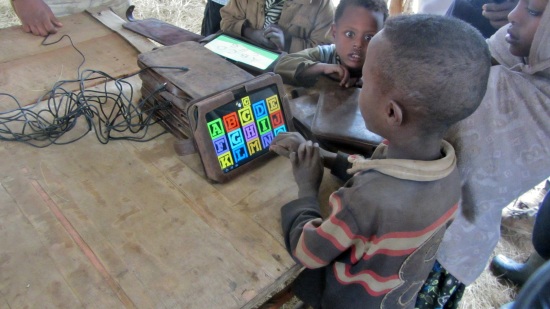
Whiz kid showing us his ABCs (With another kid photobombing)
As Michael begins to hand them out to all the other children, similar sounds and letter pronunciations filled the hut. I watched one group of kids gather around a tablet that was going through simple words in the English language. The program worked by repeating phrases with different pictures: "Ahh, Ahh, Apple!" or "C,C, Cat!" or "D, D, Dog!" I started laughing when it got to "O, O, Octopus!" These kids might not even conceptualize what an octopus is, but they sure can pronounce it!
Although humorous, this is my only place for critique. These generic apps work amazingly in helping them learn the alphabet, but they were clearly designed for an American audience. It would be incredible to see applications tailored to their own Ethiopian lives, relating what they learn everyday to the setting around them. "A, A, Africa!"
But the kids continued to play, and an adult encouraged one to get up and lead her classmates through the alphabet again. She stood up in front of everyone with the tablet and began to point to random letters, quizzing her classmates who got them all correct. The tablets are being used in a school environment and encouraging group participation, not just individual understanding. It was fascinating to watch.
As we continued to interact with the kids and watch them play around on the tablets, this incredible sense of excitement and hope kept building in me. It's hard to describe, but when watching these children you quickly realize that this program is working exactly the way it is supposed to: These kids are learning from these devices in ways they wouldn't be able to before, and they're excited about it. An overwhelming sense of excitement and optimism overtook us, and we couldn't stop smiling as we watched. This technology is empowering them in a direction to change their lives.
We stayed for well over an hour, hearing Michael talk about the program and watching the kids learn. We took dozens of pictures, trying to capture everything going on around us. The kids were all too shy to ask for their picture to be taken, but as soon as I pulled my camera out they flocked to be in the frame. Even as we said goodbye they ran up the hill with us, some even running after the cars as we drove away.
That was by far the best day I spent in Africa, and the best day I've had this summer (barring my 21st birthday). We left with such a feeling of inspiration and optimism, amazed at witnessing two completely different worlds collide. Or not so much "collide," but instead we saw a "fusion" with one another, enabling these kids to learn in imaginative ways through the technology. My friend Zach said this was the best thing he has done in a long time, and I agreed. We hadn't even contributed anything! We were saying that because what we saw had such an impact on us, opened our eyes to a bigger picture of the world.
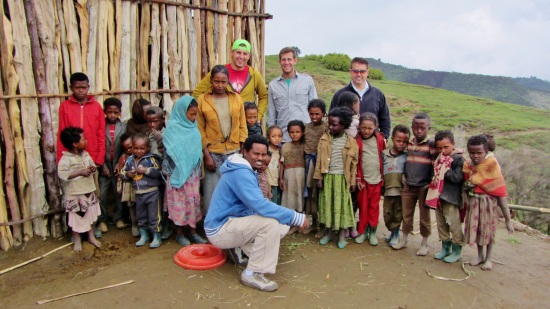
A group shot with our adviser Dan Evans and Michael out in front
As we rode away I told Zach "I hope they realize it someday. I hope that someday one of those kids will say, 'When I was only 4 years old, the laptop project from MIT came to my village, and it forever changed my future.' What an amazing perspective that person will have. One day they might understand it." This was not foreign aid, or handouts to their people. This was education, and just the first step in enabling them. Enabling the young minds of Africa for brighter futures. For a brighter nation, and a brighter continent.
Evan Szablowski grew up in Bakersfield, California and is currently a senior cadet at the United States Military Academy at West Point. He majors in mathematics specializing on Data Analytics and Mass Collaboration, with interest in Network Science and Social Media applications to the Military. He shared this experience after witnessing OLPC's work in Ethiopia.
Resumen en español: Gracias a una alerta de Google News descubrí este articulo notable por Evan Szablowski. Él estaba investigando un otro proyecto en Etiopía, cuando se le presentó la oportunidad de visitar el pueblo donde se lleva a cabo el previamente anunciado pre-piloto del despliegue de helicópteros de Nicholas Negroponte. El texto anterior es un extracto del post original de Evan Szablowski y esta republicado acá con su permiso.
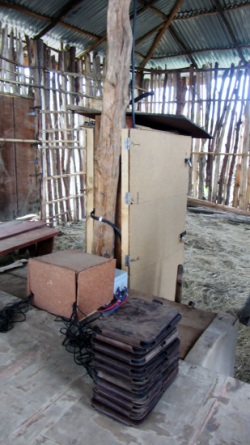
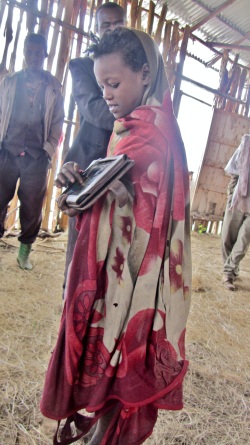


Look Ma! No teacher training :-) Looks like it *can* be done without training the teachers first!
Thanks so much for finding and posting this Christoph. Part of it took me 'back to my youth' in terms of the excitement of seeing first hand how capable kids really are. 12 years as an educator, teacher trainer, and manger of ICT deployment projects however has also seen me learn that that spark can easily die or be wasted if knowledge is given without context, or the guidance of a teacher. It does seem that perhaps Michael or another village member may be playing this role? If so then there is a goo chance of the deployment having a sustainable impact.